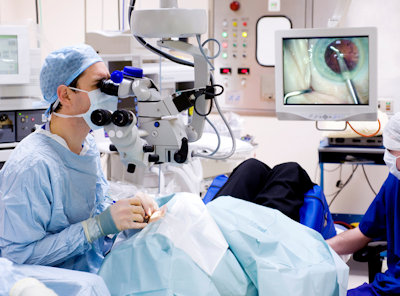When should you have cataracts removed? Millions of Americans have asked that very question. That’s how many people currently have cataracts. If you’re one of them, you need the amazing eye care that can only be provided by Elmquist Eye Group.
Cataracts Are Age-Related
 The protein breakdown that causes cataracts is a normal part of aging. As this breakdown occurs, the proteins clump and cloud the eye lens, creating a cataract ranging from mild to severe depending on the amount of protein present. At age 60, you likely have begun forming early-stage cataracts but also likely have no symptoms. By age 75, many patients have a cataract extensive enough to interfere with vision.
The protein breakdown that causes cataracts is a normal part of aging. As this breakdown occurs, the proteins clump and cloud the eye lens, creating a cataract ranging from mild to severe depending on the amount of protein present. At age 60, you likely have begun forming early-stage cataracts but also likely have no symptoms. By age 75, many patients have a cataract extensive enough to interfere with vision.
Other Causes of Cataracts
Age is certainly not the only cause of cataracts. Genetics play a role and may certain patients more prone to cataract development. People with complicating illnesses like diabetes and hypertension are at greater risk; these illnesses can also mean that a cataract will progress faster and also occur at a younger age. Certain medications like statins or steroids also contribute to cataract development. The environment plays a role as well; if your eyes are unprotected and suffer long-term exposure to UVA and UVB from the sun, cataracts may form earlier in your eye or eyes.
Our Cataract Team
You may be experiencing cataract symptoms and wondering what qualities to look for in a cataract surgery doctor? Of course you want a highly trained cataract surgeon like the highly qualified specialists at Elmquist Eye Group.
At Elmquist Eye Group, we have an experienced team of surgeons trained at the world’s most respected medical facilities. All are board-certified by the American Board of Ophthalmology, which is a well-respected, independent organization with the responsibility of certifying U.S. eye surgeons. Even with certification, our cataract surgeons take it one step further, continually working and training to update their skills to offer patients the latest eye care advancements.
What Is The Remedy?
Unfortunately, eye drops or medications will not make your cataract go away. We can often make more frequent adjustments to your prescription eyeglasses to help the increasingly blurry vision, but eventually, cataract surgery is the only remedy and the only way to permanently fix the cataract. We remove the clouded natural lens and replace it with a new artificial lens called an intraocular lens (IOL) implant. We can even add vision correct to the artificial lens.
Patients don’t necessarily have to have cataract surgery right away, but when blurred vision begins interfering with normal daily activities like reading or driving, we recommend the surgery.
Are Cataracts Affecting You?
If so, you’re not alone. Millions of people have cataracts, but may not know it because symptoms are not severe enough to interfere with vision.
If you have cataracts, consider a consultation and initial visit with one of our experts on the Elmquist Eye Group surgical team. We want you to have all possible information about cataracts and cataract treatment, so give us a call and schedule an appointment today.
